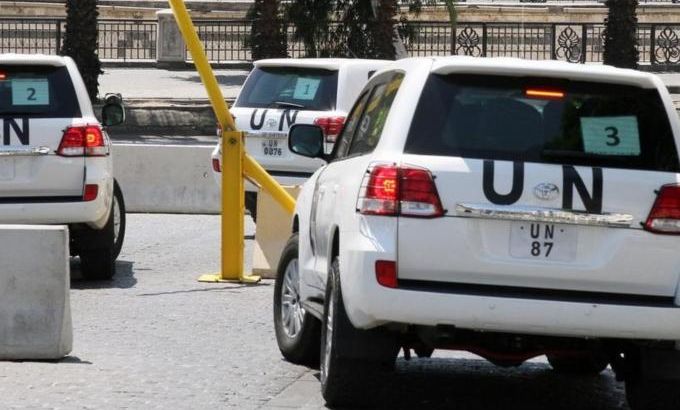Analysis of Syria gas attack could take weeks
Group overseeing probe into alleged chemical weapons attack in Damascus says it could take three weeks to complete.

Fully assessing the evidence collected by UN weapons inspectors investigating last week’s alleged chemical weapons attack in Syria could take up to three weeks, the organisation in charge of the investigation said.
The team, which included nine experts from the Organisation for the Prohibition of Chemical Weapons (OPCW) and three from the World Health Organisation, arrived at the OPCW’s Hague headquarters on Saturday evening after leaving Syria early in the morning.
“The evidence collected by the team will now undergo laboratory analysis and technical evaluation according to the established and recognised procedures and standards,” the OPCW said in a statement. “These procedures may take up to three weeks.”
The inspectors are seeking to determine what exactly happened in an alleged chemical weapons strike that killed hundreds in Damascus suburbs on August 21.
A UN spokesman on Saturday vehemently rejected suggestions that the inspectors left the country to allow US air strikes, and said the world body’s humanitarian work in the country would continue.
“I have seen all kinds of reporting suggesting that the departure of the chemical weapons team somehow opens a window for military action of some kind,” Martin Nesirky told reporters.
“Frankly, that’s grotesque, and it’s also an affront to the more than 1,000 staff, UN staff, who are on the ground in Syria delivering humanitarian aid and who will continue to deliver critical aid,” he said.
‘Uniquely capable’
He also responded to US Secretary of State John Kerry’s remarks on Friday that the UN chemical weapons experts cannot provide any information that the US, which blames Syrian President Bashar al-Assad for last week’s attack, does not already have.
“The United Nations mission is uniquely capable of establishing in an impartial and credible manner the facts of any use of chemical weapons based directly on evidence collected on the ground,” he said.
Kerry suggested that the UN investigation would have no bearing on Washington’s decision about whether to attack Syria in retaliation for the attack which according to an unclassified report by US intelligence agencies killed 1,429 people.
Nesirky said the UN chemical weapons inspection team is now in The Hague, where samples they collected in Syria are expected to be repackaged and sent to laboratories around Europe for analysis.
“This is not an electoral process, where you have exit polls and preliminary results,” he said.
“This is a scientific process. The only result that counts is the result of the analysis in laboratories and the analysis of the evidence that’s been collected through witness statements and so on.”